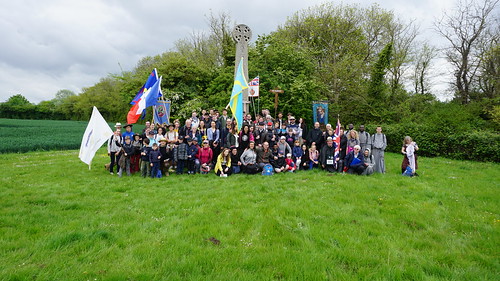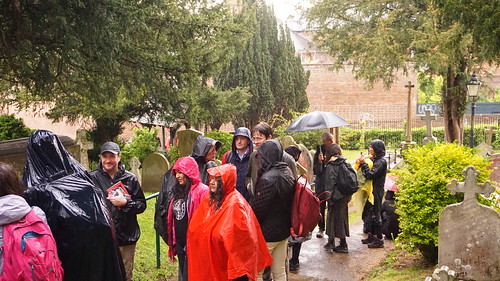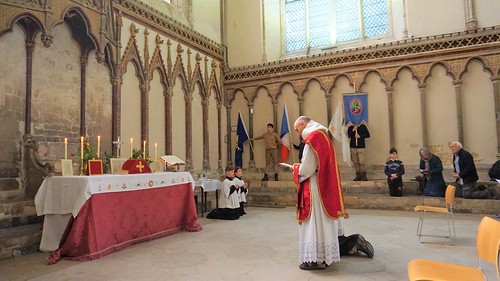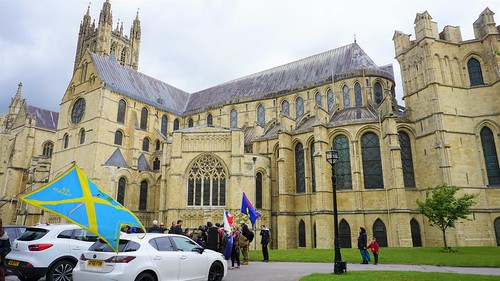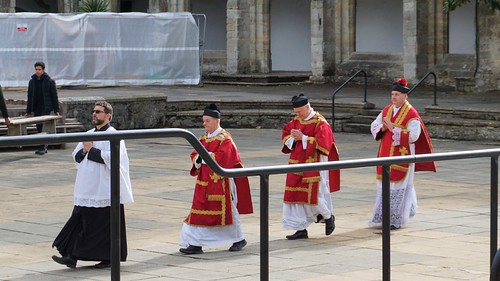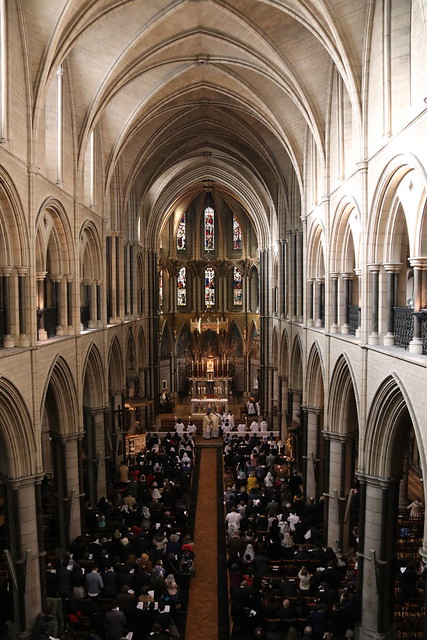Chairman's Blog
Promotional Video from Una Voce Scotland
This is nice.
Nice guys finish last?
A popular idea is that men who are desperate or deprived of chances for sex will be more likely to use coercion. This is known as the “mate deprivation hypothesis.” However, studies suggest the opposite is the case. Men who have more partners report higher levels of sexual aggression compared to men with fewer partners. Furthermore, men who predict that their future earnings will be high also report greater levels of sexual aggression relative to men who predict that their future earnings will be low.
One contributing factor may be an empathy deficit—the book reports that high status is linked to lower levels of empathy. Men high on Dark Triad traits are viewed as more attractive by women, are more likely to have consensual sexual partners, and are more likely to engage in sexual coercion.
Personal virtue is not very well correlated with ease of finding a soulmate. It may be only slightly correlated, uncorrelated, or even anti-correlated in different situations. Even smart people who want various virtues in a soulmate usually use them as a rule-out criterion, rather than a rule-in criterion – that is, given someone whom they are already attracted to, they will eliminate him if he does not have those virtues. The rule-in criterion that makes you attractive to people is mysterious and mostly orthogonal to virtue. This is true both in men and women, but in different ways. Male attractiveness seems to depend on things like a kind of social skills which is not necessarily the same kind of social skills people who want to teach you social skills will teach, testosterone level, social status, and whatever you call the ability to just ask someone out, consequences be damned. These can be obtained in very many different ways that are partly within your control, but they are complicated and subtle and if you naively aim for cliched versions of the terms you will fail. There is a lot of good discussion about how to get these things. Here is a list of resources that might be able to help you.
Of course, then you’ve got to have your resource list. And – and this is the part of this post I think will be controversial (!), I think a lot of the appropriate material is concentrated in the manosphere, ie the people who do not hate your guts merely for acknowledging the existence of the issue. Yes, it is interspersed with poisonous beliefs about women being terrible, but if you have more than a quarter or so of a soul, it is pretty easy to filter those out and concentrate on the good ones. Many feminists will say there are no good ones and that they are all exactly the same, but you should not believe them for approximately the same reason you should not believe anyone else who claims the outgroup is completely homogenous and uniformly evil. Ozy has tried to pick out some of the better ones for you at the bottom of their their anti-Heartiste FAQ, and Drew on Tumblr has added to the discussion.
New article on liturgical hygiene
Sergey Budaev, "Safety and Reverence: How Roman Catholic Liturgy Can Respond to the COVID-19 Pandemic" Journal of Religion and Health (2021), published 24th May 2021.
Among many interesting observations of this article, which cites a great many studies, is that while reception on the tongue does not appear to be more dangerous than reception in the hand, reception kneeling is clearly preferable to reception standing. We reproduce a key passage below; the whole article can be read here (or download the pdf here).
The Holy Species used in the Latin Rite is nearly dry and therefore is likely to have low adhesion of outside particles, further reducing the infectious risk. While receiving the Holy Bread, the communicant normally extends the tongue forward, requiring to hold breath for a while. This reduces possible respiratory output. The traditional manner of receiving Communion on the tongue is therefore unlikely to incur a high risk of infection transmission.
Traditional reverent practice of the Catholic Church incorporates additional elements making it even less risky in the current COVID-19 pandemic. The kneeling position of the faithful while receiving the Host would provide spatial distancing about 50 cm (Fig. 1a): the communicant’s face is located at the level of the chest of the Eucharistic Minister. Provided the communicant stays silent, uses nasal breathing, and the duration of the interaction is short (very few seconds), this would not incur a high risk to the Eucharistic Minister (usually the priest whose safety is prioritized, see above). Furthermore, reduced verbal response of the communicant directs the droplets and aerosol towards the chest of the Minister, which is by far a lower risk than in the face.
In contrast, the typical position of the communicant for Communion in the hand is standing which is the direct, close, face-to-face interaction (Fig. 1b). Any verbal interaction between the Eucharistic Minister and the communicant would direct the droplets and aerosol directly to the Minister’s face and the Holy Bread. Inhaling such aerosol could be risky. The statistical argument (see “” above) points to an increasing probability that in a large group, at least one member is infected, further aggravating the risk to the Minister. If the communicant happens to cough or sneeze, Minister’s face and the Holy Bread become the direct target of both fine and larger ballistic droplets. This is very unlikely in the kneeling position.
Another potentially important factor is that it would be much easier for the Minister to operate fine motorics when the communicant is kneeling than standing. This is due to a much better visual feedback and more convenient hand position when the communicant is kneeling (note that fine manual workers such as watchmakers use tables for routine work rather than stands elevated to the level of their eyes). This would make it easier for the Minister to place the Holy Host optimally and safely on the tongue, avoiding contacts with the mucous membrane and the saliva.
Even though the hands of the Communicant are often assumed to be clean, there is no guarantee. Again, the statistical argument (see above) points to an exponentially growing chance for at least one person with contaminated hands to occur as the group size increases. The typical position of the hands during the prayer—directly in front of the face—makes them susceptible to contamination by exalted and ballistic droplets and aerosol. The assumption that Communion in the hand carries no or little risk is not well grounded and may in fact create a false sense of security potentially provoking more reckless behaviour of both the Minister and the communicant.
Appeal for St Walburght's, Preston, from the ICKSP
The church of St Walburgh in Preston is an important part of the heritage of Catholics, not just of the immediate area but of the country. Now under the care of the Institute of Christ the King Sovereign Priest, it inevitably needs restoration to re-roof it and re-order - or un-re-order - the sanctuary. I recommend this appeal.
----------------------------
Canon Cristofoli of the Institute of Christ the King Sovereign Priest has launched an appeal to restore the beautiful, Grade 1 listed, St. Walburge’s Shine church in Preston, Lancashire to its former glory.
St. Walburge’s was built in the mid 19th century by the Catholic, Gothic revival architect Joseph Hansom, and is famous for having the tallest spire of any parish church in Great Britain. Howell and Sutton describe it as ‘one of the most extraordinary churches in Britain’. Bryan Little described it enthusiastically as ‘a building which ranks among Joseph Hansom’s best, and whose roof is perhaps the most masterly ever put on any Victorian Church’.
Following a diocesan reorganisation to cope with the falling numbers of priests and church attendees, St. Walburge’s faced being decommissioned and was given a seven-year stay of execution in 2008. St. Walburge’s would have closed if no other use for it had been found. The church was locked apart from one Mass per week and the future looked bleak.
After a time of reflection between the Rt. Rvd Michael Campbell, Bishop of Lancaster and Monsignor Gilles Wach, General Prior of the Institute of Christ the King Sovereign Priest, St. Walburge’s secured a new lease of life. Today, it is a centre for Eucharistic Adoration and celebration of the sacraments in the traditional Latin form beloved by saints and generations of Catholics. The traditional Latin Mass is celebrated daily and the congregation is growing as new people discover its timeless beauty and reverence.
 The years of neglect have taken their toll, however, on this remarkable monument to the faith and sacrifices of our forebears and the extreme weather we have experienced over the last few winters has accelerated the problems. The need for a new roof has become urgent if even worse damage is to
The years of neglect have taken their toll, however, on this remarkable monument to the faith and sacrifices of our forebears and the extreme weather we have experienced over the last few winters has accelerated the problems. The need for a new roof has become urgent if even worse damage is to
be avoided. It is raining inside in various places, including onto the unusual war memorial altar with its medieval crucifix. The heating system was removed because it was beyond repair, so the congregation and clergy are managing without adequate heating as winter approaches once more. Dry rot in the parish hall, a Grade 2 listed building, is also a cause for concern. The immediate need is for £500,000 to tackle the most pressing repairs.
In addition to the vital repair works, the Canons and people would like to restore St. Walburge’s to its former magnificence by reinstating the sanctuary with its fine marble altar rails to its arrangement before the reordering in the 1970s, improving the lighting and redecorating. The stunning Victorian stained glass is currently at risk and needs protection.
The Canons and people of St. Walburge’s would be very grateful for any help you can give to restore this remarkable church for the glory of God, and ask especially for your prayers for the success of this huge project. Thank you.
Link for joining the Friends of St. Walburge's:
https://www.goldengiving.com/m/Friendsofstwalburges
Link for the restoration appeal:
https://www.goldengiving.com/fundr.../st-walburges-restoration
Link for Easyfundraising:
https://www.easyfundraising.org.uk/causes/stwalburgescc/
Ramsgate to Aylesford walking pilgrimage: photos
Mass in the Shrine of Aylesford, celebrated by Canon Martin Edwards, assisted by Fr Basden (as deacon) and Fr Finigan (subdeacon).
More Socratic Seminars: read Plato's dialogues with me
My seminars on the early dialogues continue, and the current series concludes next week.
Plato's dialogues are literary and philosophical masterpieces, exposing the limitations of common sense and setting out the philosophical attitudes and methods which have set the tone of the discipline from Plato's day to the present. I started these seminars during the lockdown, but the possibility of teaching anyone interested, and without regard to distance, suggests that they may have longer to run.
The premise of the series is that pretty well anyone with the necessary time (not very much is needed) and interest can engage profitably with the short early dialogues. Doing so is sufficient preparation, for those who want to, to continue with some of the slightly more complex and longer ones.
Just now I have been leading two seminars: one on four short early dialogues, and one on two longer ones: Protagoras and Gorgias.
With a view to starting in the week of 14th June, I am offering
Series 1: for those new to this.
1: Euthyphro (on piety), Ion (on poetic inspiration), Lysis (on friendship), and Laches (on courage).
Series 3: for returning students.
3: Hippias Major (on beauty), Meno (on virtue), Euthydemus (on the eristic method), and Clitophon, Theages, & Alcibiades (different takes on the Socratic method, attributed to Plato).
Plus Series 5: for returning students who have done both beginners' and intermediate seminars.
5: Phaedo (on the afterlife); Phaedrus (on the nature of the soul): each divided into two parts.
More Online Latin (and Greek) Courses
-----------
Matthew Spencer
Matthew offers a range of courses, including introductory and intermediate Latin, classical and koine (New Testament) Greek, entirely online.
The Introductory New Testament Greek course is the ideal preparation for the Latin Mass Society’s residential course above, at which Mr Spencer will be the Greek tutor.
Seminarians and clergy can claim half the cost of Latin courses with Mr Spencer back from the Latin Mass Society.
For his current offerings, see this pdf.
Sr Tamsin Geach, ‘Latin in 50 Lessons’
This is also highly recommended, though not associated with the Latin Mass Society. See her website here
Traditional Confirmations in London, 10th July: book now
Bishop John Sherrington (Auxiliary Bishop of Westminster) will confer the Sacrament of Confirmation in the Traditional Rite on Saturday, 10 July 2021 at St James's Spanish Place, London W1U 3QY, at 11.30am. This will be followed by Pontifical Benediction.
To register your child or yourself for Confirmation, please complete the registration form below.
The deadline for registering and submitting the required documentation is FRIDAY 18 JUNE 2021.
More details, and online booking form, here.
St Benedict's Academy, Warrington
In association with the apostolate of the Institute of Christ the King Sovereign Priest in Preston, Lancashire, St Benedict's Academy is calling for expressions of interest in enrolling children in their programme from this September. They have produced this video; contact details below.
Saint Benedict’s Catholic Academy, in the city of Preston (Priest Town) provides a classically taught curriculum for your children in a Catholic environment.
For more information please 
Something about the New Feminism Blogger doesn't want you to see
This post, from February, was deleted last night by Blogger. The explanation was that it violated their terms of service in relation to 'malware and viruses'. Hmm.
-----
Most people are blissfully unaware of the vast extent of intellectual fakery which inhabits universities around the world. The fact that a great deal of it is paid for by taxpayers is bad enough, but sometimes it rises to levels which raise a different kind of question. This is the case with this articleby Alison Phipps, Professor of Gender Studies at Sussex University. She shares this institution with the ‘Gender Critical’ feminist Kathleen Stock whom I wrote about here, but describesher colleague’s views, such as that women should not have share refuges with biological males, as beneath debate (“‘Reasonable debate’ cannot counter unreasonable ideas.”). In the article, Phipps writes that women expressing trauma about sexual violation, a phenomenon she describes as “white tears”, is a tool of oppression.
It is difficult to find words to do justice to the outrageous nature of this claim, and it calamitous consequences if taken seriously. But these are not the ravings of a lone madwoman. Phipps is a professor at a serious university, these reflections of hers are published in a mainstream journal, and she has also published a book on the same theme, with Manchester University Press. More significantly, she is one of many radical feminists of the new school. Put “white tears” (with quotation marks) into Twitter’s search bar, and say hello to a truly grim new world.
Phipps’ central idea is summed up in the title of her book: “Me Not You”. In the cover design these words are superimposed on the words “Me Too”. The idea is that when a woman complains about being raped, as happened with the “MeToo” movement, she is drawing attention to her own suffering, and therefore drawing attention away from the suffering of others. If she is relatively privileged, this is an act of oppression against those less privileged than her, who are thereby silenced.
It is a very strange argument. It is certainly true that when a more “privileged” person is the victim of abuse or injustice, he or she has an opportunity to fight back which other victims may lack. All kinds of resources, contacts, legal assistance and so on may be available to such a victim. Again, an abuser so bold as to tackle a Hollywood star, for example, will almost certainly have been abusing less well-connected victims. Is this a reason for the star to ignore the abuse and remain silent? Of course not. When the most well-resourced victims, the ones with least to fear, finally turned on Harvey Weinstein, they did what many other victims could not so easily do: they brought his abuse to an end.
As a matter of fact, even very humble victims of abuse can sometimes be successful. The gilded career of Dominique Strauss-Kahn, then head of the International Monetary Fund, was shipwrecked by a New York hotel maid. (The criminal prosecution was dropped but he settled a civil suit out of court.) As so often happens, when the appearance of vulnerability is diminished, other victims come forward. In one sense it doesn’t matter who is the first victim to take the plunge with a formal accusation, but I bet the poorer, more isolated, and less well-advised ones fervently hope that the way will be cleared by someone with the best possible chance of success.
Indeed, I would say that to make an accusation can in certain circumstances be a public duty, and this is a duty particularly incumbent on the most privileged. If an abuser can silence even them, then he is truly invulnerable. Many victims of abuse are plagued with the worry that they won’t be believed, but someone whose social status gives them credibility can make the testimony of other victims’ more credible.
In Phipp’s world view, one might imagine that there is a limited amount of outrage to go round, but the “MeToo” movement showed, on the contrary, how outrage can magnify itself: the more outrage is generated, the more, in some cases, there is left over for others. It is certainly not a zero-sum game.
What are the practical implications of Phipps’ view? That those considering complaining about any kind of bad treatment should “check their privilege” and remain silent if they decide that they lack status in the inverted hierarchy of victimhood, which is conceived of at least in part in racial terms. This is not an inversion of the view she is attacking: she is actually doing the same thing as she accuses others of doing: namely, of determining, by reference to an arbitrary and racially-aligned set of criteria, who is to be allowed justice, and who should continue to suffer exploitation and abuse in silence.
In her world, it is to be women, above all, whose abuse will be tolerated, and whose suffering ignored. This is the woke Feminism of the 21stcentury, whose advice to women seems to be “suck it up, buttercup”.


